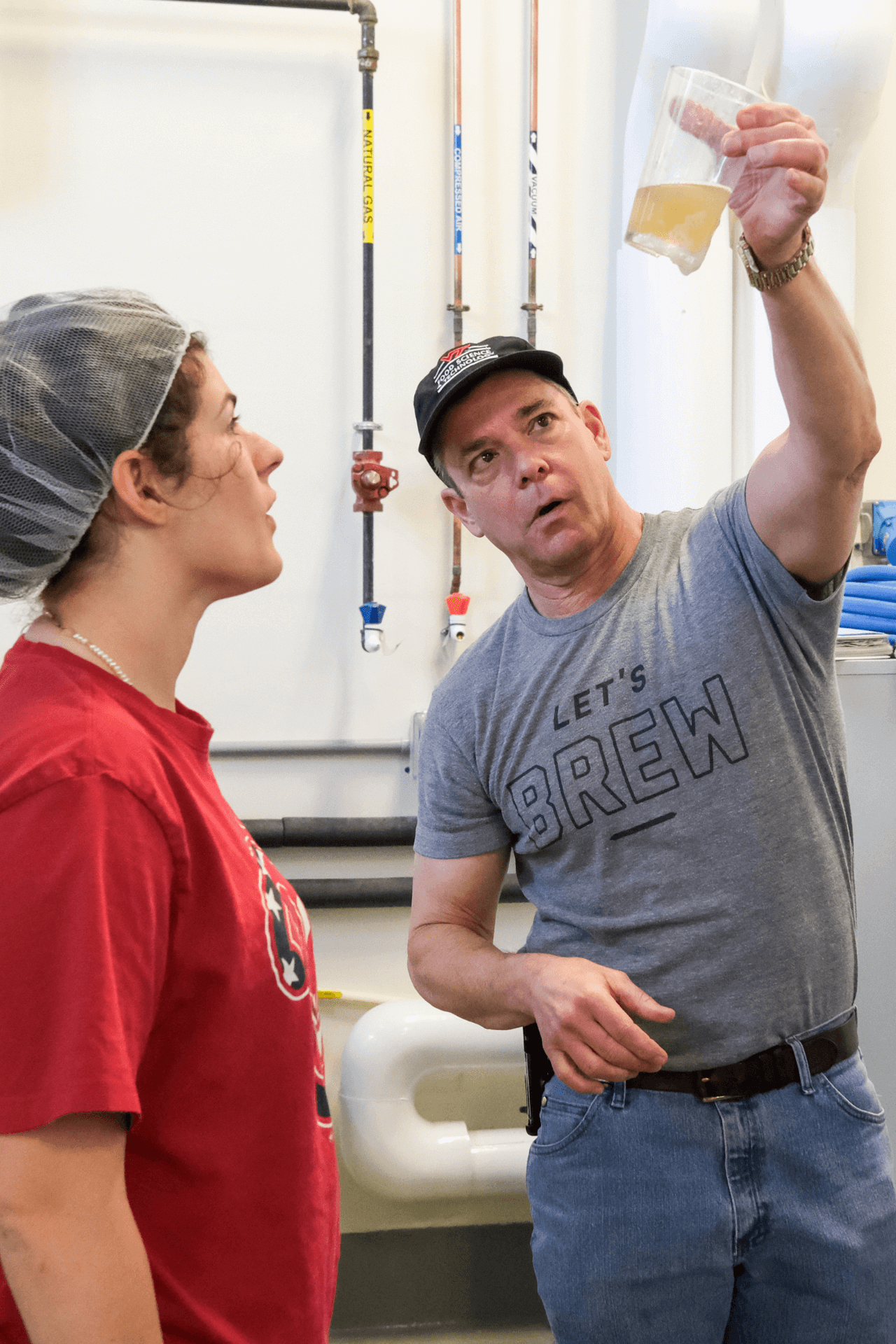Ph.D. in Food Science & Technology

A number of our faculty members offer doctoral programs in cutting edge fields, such as cellular agriculture, antibiotic resistance, and climate change's affect on agriculture.
The department offers a graduate program leading to a doctoral degree that is built around courses in food science and technology, supported by courses in chemistry, biochemistry, microbiology, mathematics, statistics, engineering, and biology. Individual graduate programs are planned with the advisor to prepare students for opportunities in industry, academia, and government. On a limited basis, selected students can complete a Ph.D. program without earning a master's degree.
Why get a Ph.D. in Food Science?
Our program is designed to train accomplished and capable food scientists who can contribute effectively to our mission of increasing the safety, quality, and marketability of the global food supply. Students will participate in innovative and novel research utilizing sophisticated lab spaces guided by some of the top faculty in their respective fields. Many of these disciplines are on the cutting edge of scientific advancement and have only come into existence within the last decade. The enriching hands-on experience and professional connections created by this program prepare students to graduate into fulfilling careers.

The median salary for food scientists with a doctorate is $127,000.

86% of food scientists report being satisfied with their job, with Ph.D. holders having the highest level of satisfaction.

Expected annual growth for food science occupations is 9% through 2030, higher than average for all jobs.

What can I do with this degree?
There is high demand for food scientists with doctorates across a wide range of disciplines throughout academia, industry, and government. Our graduates are often hired by large food companies (product development, food safety, process engineering), public health agencies (research and food safety), and by academic institutions (research and teaching). Recent grads have found employment with Tyson, the USDA, Nestlé, the FDA, Smithfield Foods, E&J Gallo Wineries, and many more.

Aquaculture
Advance aquaculture technologies used for producing freshwater and marine seafood.
Enhance the quality of aquaculture-produced seafood to feed the growing demand and expanding populations.

Cellular Agriculture
and Alternative Meats
Develop Artificial Intelligence-based platform, bioprocessing, and fermentation for cellular agriculture
Develop and characterize cell lines for cellular agriculture
Discover novel plant-based scaffold for whole cut fish development using Bioprinting

Education and
Extension
Develop interventions and educational programs to empower food handlers to use safer practices

Brewing Science
Develop and evaluate vineyard and orchard management, fermentation, and processing practices used in wine and hard cider production
Determine brewing quality of Virginia grown barley and hops

Food and
Flavor Chemistry
Understand the science behind the human perception of food, including taste, aroma, mouthfeel and appearance
Flavor chemistry seeks to understand and influence these traits through the chemical processes and interactions of a food’s components

Food Processing, Packaging and Engineering
Understand basic molecular reactions, flavor chemistry, food composition, component interactions, and physical properties of food systems
Apply and characterize changes in food quality attributes, such as texture, color, flavor, and nutrition
Characterize nano-, micro- and macro-scale molecular changes that influence food structure

Food Safety
and Microbiology
Develop new methods to process food products safely through thermal and aseptic processing; dehydration, and modified atmosphere packaging
Use nondestructive evaluation methods to characterize food components
Observe how food packaging affects the characteristics of the food
Create new methods and unit processes for food processing and packaging
Develop nanospike-enabled antimicrobial food contact surfaces (e.g., stainless steel countertop, packaging materials)
AI/ML-aided material design and discovery to improve barrier properties of food packaging
Immobilizing lactase (or cascades of enzymes) on filtration membranes for upcycling the lactose in acid whey
Fabrication of affordable gas sensors for monitoring food spoilage inside primary food packaging (i.e., intelligent packaging)

Functional Foods
for Health
Examine the role of sub-lethal stresses encountered during food processing on the survival, persistence, and virulence of food-borne pathogens
Develop interventions to prevent food contamination by food-borne pathogens and improve recovery during pre-harvest, post-harvest, and food preparation
Examine the effect of functional foods on the microbial ecology of gastrointestinal and food systems
Discover novel antimicrobial compounds, extracted from natural sources, to reduce pathogenic and spoilage microorganisms in foods
Characterize virulence factors and their role in disease severity
Utilize genomic and transcriptomic approaches to understand host-pathogen interactions of food-borne pathogens

Product Development
Use pre- and pro-biotics to improve health including gut metabolism reduction inflammation, inhibiting pathogens, and stimulation of gut microbial activity
Understand the influence of food and beverage fermentation processes on product quality and composition of bioactive compounds
Analytically assess bioactive components and how they work emphasizing chemistry and biochemistry
Characterize the influence of dietary compounds on cancer-induced taste disorders

Flavor and texture development in products of cellular agriculture
Development of nutritions snack formulations for developing countries
Credit Hours
Includes at least 30 credits of Research and Dissertation, 27 credits of 5000+ level courses, and 3 credits of Graduate Seminar.
Applications Due Feb. 1 and Sept. 1
We are now accepting applications for the Fall and Spring semesters! Fall semester applications are due to the Graduate School by February 1 and Spring semester applications are due by September 1.
Find Your Advisor
See our program webpage for a list of which faculty are recruiting Ph.D. students. Once you find someone whose research matches your interests, reach out to them to learn more about their program!
Funding Resources
The majority of our Ph.D. students are fully funded through research or teaching assistantships, scholarships, and fellowships. To learn more about funding, contact the Graduate Program Coordinator.
Lab Spaces & Facilities
The department houses state-of-the-art facilities to accommodate the full breadth of FST research, including food processing and food safety pilot plants, an aquaculture lab, a research brewery, a fully-equipped sensory evaluation lab, a research winery and enology lab, and numerous other teaching laboratory and classroom spaces.
Blacksburg, VA
FST is located on Virginia Tech's main campus in beautiful Blacksburg. Nestled in the foothills of the Blue Ridge Mountains, Blacksburg is consistently ranked among the top college towns in the US for its thriving local scene, welcoming community atmosphere, and small town charm.
The departmental course/credit requirements for the Ph.D. degree in Life Sciences (Food Science & Technology) include completion of at least 90 graduate credits, composed of the following:
- at least 30 (max. of 60) credits of Research and Dissertation (FST 7994)
- at least 27 credits of 5000 level courses
- at least 3 (maximum of 4) credits in Graduate Seminar (FST 5004)
- a maximum of 6 credits of 4000 level courses
- a maximum of 12 credits of Special Study or Independent Study
The 5000 level courses must include at least 9 credits of FST department courses. Additionally a 5000 level biochemistry course (typically BCHM 5124) and two 5000 level statistics course (typically STAT 5605 & 5606, or 5615 & 5616) and our Graduate Professionalism in Food Science course (FST 5054) are required. Graduate students will need to complete the following courses (or an equivalent) if they were part of their previous degree program:
- Food Chemistry (FST 4504)
- Food Microbiology or Advances in Food Micro (FST 3604 or 5604)
- Food Processing (FST 4304) or Food Safety and Quality Assurance (FST 4524)

"The food science training and lessons learned navigating the path to a doctoral degree provided me with the technical knowledge base and instilled the sense of resiliency and leadership that I use every day to embrace the challenge of constant change while remaining focused on the goal – a safe, affordable, and nutritious food supply."
Dr. Jodi Williams
Alumna and Food Safety National Program Leader at the USDA NIFA
-
Bio ItemAlexis M. Hamilton , bio
Extension Specialist and Assistant Professor: Food Processing Microbiology
-
Bio Item
 Dennis Cladis , bio
Dennis Cladis , bioAssistant Professor: Phytochemistry and Functional Foods
-
Bio Item
 Haibo Huang , bio
Haibo Huang , bioAssociate Professor: Food Processing, Fermentation Engineering, Process Simulation and Economic Analysis
-
Bio Item
-2.jpg.transform/s-medium/image.jpg) Monica Ponder , bio
Monica Ponder , bioProfessor: Microbiology
-
Bio Item
 Yun Yin , bio
Yun Yin , bioAssistant Professor: Aroma and Flavor Compounds in Food Systems, Flavor Analysis and Sensory Evaluation

Food and Beverage Fermentation
The study of fermentation concerns the use of microorganisms

Food Safety and Food Microbiology
Exploring the interactions between microbial communities

Phytochemicals and Functional Foods for Health
Functional foods are those that may offer health benefits beyond their nutritional value

Food Processing and Engineering
Utilizing food processing operations to produce safe, nutritious, sustainable, and value-added products

Food and Flavor Chemistry and Sensory Science
The science behind the human perception of food

Aquaculture
Diving into the breeding, raising, and harvesting of seafood in a controlled environment



